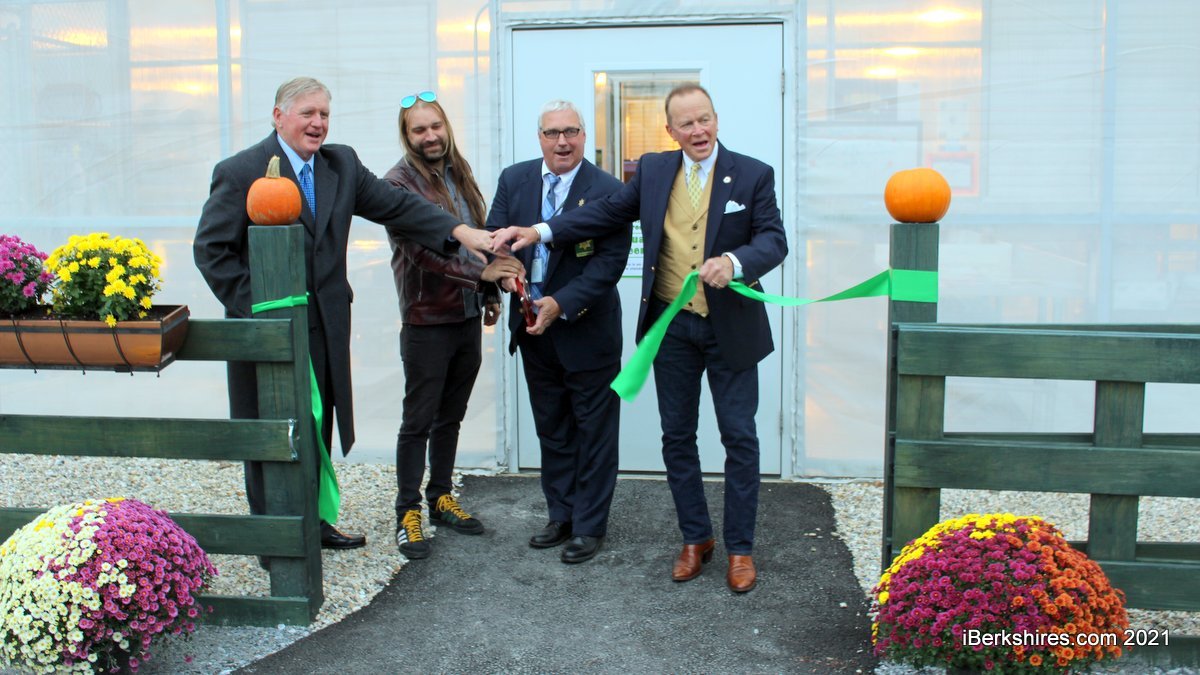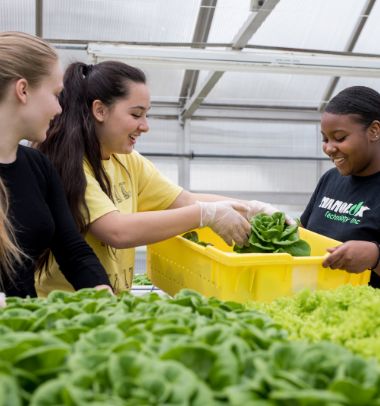PITTSFIELD, Mass. — The Berkshire County House of Correction has had something fishy going on for awhile now.
Community leaders and others got a chance on Wednesday to tour an inmate-run greenhouse that takes hydroponics — growing plants in a nutrient solution — to another level of sustainability by using fish waste as fertilizer. While producing both fish and produce, the facility also provides inmates with valuable skills that can be transferred to life outside of the jail.
Each of the 30 towns and both cities in Berkshire County have received food from the aquaponics lab, which donates its produce to food banks, shelters and community kitchens. More than 100,000 heads of lettuce and other vegetables have gone out into the community over the past 20 months.
"Our job is to put people back into the community a much better person when they leave than when they came in, and we do that by helping them and give them the skills, the resources, the capability, the skill set of staying on a positive structured lifestyle that they have inside these walls while they're incarcerated so that when they go back out, they can maintain that same positive structured lifestyle out in the community," Sheriff Thomas Bowler said.
"This program is one of those innovative programs that not only does that for the inmate population but is also a benefit and contributes back to our community."
The facility was completed in January 2020 and was funded privately through foundations, local businesses, gifts in kind, and individuals. It cost about $700,000 to build and get running. The pandemic delayed public celebration last year so the official ribbon-cutting was held on Wednesday and the two inmates working in the greenhouse gave tours.
Gov. Charlie Baker and Lt. Gov. Karyn Polito had been scheduled to attend but had to cancel after the Boston area was hit with power outages and flooding from Tuesday night's Nor'easter. Bowler was joined by both Mayors Linda Tyer of Pittsfield and Thomas Bernard of North Adams, state Sen. Adam Hinds, state Reps. Tricia Farley-Bouvier and Paul Mark, and the region's former senator, Benjamin Downing.
Hybrid tilapias produce a nitrogen-rich fertilizer to keep the greens growing. The waste is filtered from the 4,000-gallon tanks holding about 350 fish apiece. The filters generate the chemical reaction that creates the nutrient that flows into the two pools that grow 1,200 heads of lettuce a week. It's a constant turnover as matured greens are removed after 40-50 days as seedlings begin their journey across the pools and small fry grows into big fish as they cycle through different tanks.
The aquaponics greenhouse can grow more than a dozen different varieties of greens to supply the kitchen at the House of Corrections and food banks and charities. On Wednesday, the pools were a sea of green.
The aquaponics system is one of the few in the Northeast and is also unique as an educational and rehabilitation center for inmates. The corrections officers are trained along with the inmates to run the facility — checking pressure gauges and nutrient levels, cleaning and maintaining the building and equipment, feeding and caring for the fish, and harvesting and packing the produce.
The venture is just the latest sponsored by the sheriff's office to engage inmates at the House of Correction, including a garden and horses. The aquaponics lab is an opportunity for those who can't go out on work release but who can leave the secure facility to work in the gardens and grounds.
The idea is to give these men job skills and to learn to work as a team member, and instill a work ethic, responsibility, and pride in what they can accomplish. The greenhouse was started up by staff and then selected inmates were given the opportunity to join the effort.
Inmate Sam Wassilie has been involved with the program for more than a year and is the longest-running participant. This is a new skill for him and he claims to have been "bitten by the bug" of aquaponics, he said.
He explained that the lab is not just about producing lettuce and some fish, but about understanding how to create a self-sustaining system.
"I think that there's something really fundamental about getting back to something as basic as growing sustainable vegetables, getting your hands in the dirt and stuff," Wassilie said.
"Inside here, this is something that that's kind of new on the forefront, but something that has existed for thousands of years, it's pretty remarkable and it's not that difficult."
The idea for an aquaponics system was broached by retired Superintendent Jack Quinn five years ago after hearing about a nonprofit corrections program out of North Carolina, 100 Gardens.
The concept took off when Robin McGraw, president of the Berkshire Education and Correction Services, went to North Carolina to see the system in action and came back a convert.
The man who introduced Quinn to aquaponics was Sam Fleming of 100 Gardens, which brings aquaponics programs to schools, institutions, and communities of need. The two happened to be seated next to each other on a plane and talked about Fleming's organization and by the end of the flight, Quinn was sold — though he at first thought 100 Gardens was about growing cannabis.
"That individual Sam Fleming, who's sitting right here, let me tell you he is one of the greatest people I have ever met in my whole entire life," Quinn said.
"He does not cultivate marijuana or weed, he cultivates young minds in the Charlotte area, people that have been thrown away, kids that have been incarcerated. The organization he works with, 100 Gardens, the work they've done in Haiti, the work they've done in North Carolina, now really in different places all over the country, is just outstanding."
Fleming said aquaponics addresses three problems that the world is going to have to deal with in the next 30 years: a collapse of every major seafood species, running out of freshwater globally, and having 10 billion people on the planet.
"So how does aquaponics plan to this? Well, we feed fish to get them to market size, when we grow fish on land like we're doing here, we can stop the extraction of our wild seafood species and let our oceans rebound. Two, when we're using plants to filter out the water, we can reuse and recycle the water over and over again, saving and conserving our freshwater resources," he explained.
"And three: all the vegetables that are being pumped out can be used to feed these 10 billion people in the future, this is not just a cool way to grow food, it's actually a solution and it's an act of sustainability and conservationism."
Fleming added that the organization has also learned that aquaponics is a vehicle for making people better because it makes them more educated, engages them in a new way, and gives the gratifying sensation of eating food that was self-produced.
Many speakers at the ceremony credited McGraw for his work to make the program happen.
McGraw's support has positively impacted 100 Gardens as well, as it has grown from four schools and a juvenile corrections center to 13 schools and two correctional centers.
"We are going to touch a lot of lives," McGraw said after thanking everyone involved in the endeavor. "I think that you've seen that today and we're going to move forward doing that."




